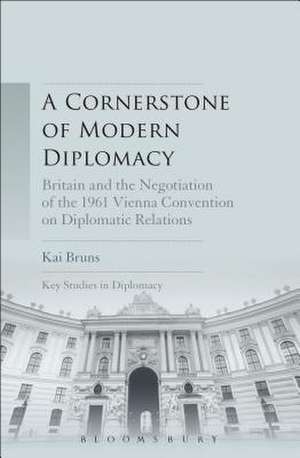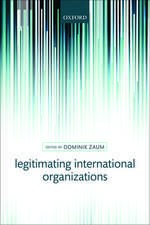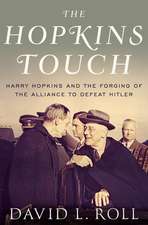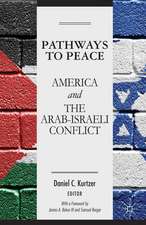A Cornerstone of Modern Diplomacy: Britain and the Negotiation of the 1961 Vienna Convention on Diplomatic Relations: Key Studies in Diplomacy
Autor Kai Brunsen Limba Engleză Paperback – 2 dec 2015
| Toate formatele și edițiile | Preț | Express |
|---|---|---|
| Paperback (1) | 256.02 lei 6-8 săpt. | |
| Bloomsbury Publishing – 2 dec 2015 | 256.02 lei 6-8 săpt. | |
| Hardback (1) | 713.72 lei 6-8 săpt. | |
| Bloomsbury Publishing – 13 aug 2014 | 713.72 lei 6-8 săpt. |
Din seria Key Studies in Diplomacy
-
 Preț: 178.40 lei
Preț: 178.40 lei -
 Preț: 206.79 lei
Preț: 206.79 lei - 23%
 Preț: 537.40 lei
Preț: 537.40 lei -
 Preț: 206.25 lei
Preț: 206.25 lei -
 Preț: 205.70 lei
Preț: 205.70 lei - 23%
 Preț: 537.32 lei
Preț: 537.32 lei - 23%
 Preț: 538.31 lei
Preț: 538.31 lei - 23%
 Preț: 569.00 lei
Preț: 569.00 lei -
 Preț: 155.34 lei
Preț: 155.34 lei - 14%
 Preț: 190.96 lei
Preț: 190.96 lei - 12%
 Preț: 259.42 lei
Preț: 259.42 lei - 13%
 Preț: 255.84 lei
Preț: 255.84 lei - 23%
 Preț: 725.00 lei
Preț: 725.00 lei -
 Preț: 281.42 lei
Preț: 281.42 lei - 23%
 Preț: 718.18 lei
Preț: 718.18 lei - 23%
 Preț: 777.15 lei
Preț: 777.15 lei - 23%
 Preț: 724.84 lei
Preț: 724.84 lei -
 Preț: 325.31 lei
Preț: 325.31 lei -
 Preț: 391.25 lei
Preț: 391.25 lei
Preț: 256.02 lei
Preț vechi: 294.62 lei
-13% Nou
Puncte Express: 384
Preț estimativ în valută:
48.99€ • 51.32$ • 40.60£
48.99€ • 51.32$ • 40.60£
Carte tipărită la comandă
Livrare economică 08-22 aprilie
Preluare comenzi: 021 569.72.76
Specificații
ISBN-13: 9781501316319
ISBN-10: 1501316311
Pagini: 248
Ilustrații: 4 halftone illus
Dimensiuni: 140 x 216 x 13 mm
Greutate: 0.29 kg
Editura: Bloomsbury Publishing
Colecția Bloomsbury Academic
Seria Key Studies in Diplomacy
Locul publicării:New York, United States
ISBN-10: 1501316311
Pagini: 248
Ilustrații: 4 halftone illus
Dimensiuni: 140 x 216 x 13 mm
Greutate: 0.29 kg
Editura: Bloomsbury Publishing
Colecția Bloomsbury Academic
Seria Key Studies in Diplomacy
Locul publicării:New York, United States
Caracteristici
Adds to the scholarship by linking today's diplomatic atmosphere to the "cornerstone" moment of the VCDR
Notă biografică
Kai Bruns is Assistant Professor at American University in the Emirates, UAE.
Cuprins
ACKNOWLEDGEMENTS/CONTENTS/FIGURES/ABBREVIATIONS/INTRODUCTION PART I: THE PREPARATORY STAGE: 1949-19601 CODIFICATION OF INTERNATIONAL LAW: ORGANS AND PROCEDURESEvolution of the International Law Commission, 1947 to 1960/ The Sixth (Legal) Committee of the United Nations General Assembly/ The Codification Process/ Conclusion2 THE INTERNATIONAL LAW COMMISSION ON DIPLOMATIC PRIVILEGES AND IMMUNITIES, 1949 - 1958The Fifth to Eighth Session of the International Law Commission, 1953 to 1956/ The Ninth Session of the International Law Commission in 1957/ The Tenth Session of the International Law Commission in 1958/ Conclusion3 BRITAIN'S FOREIGN POLICY- PROCESS: PREPARING FOR THE 1961 VIENNA CONFERENCECoordinating Britain's View on the Codification of Diplomatic Privileges and Immunities/ Dealing with the 1957 Set of Provisional Draft Articles/ Preparing the Commentary for the 1958 ILC Draft ArticlesWhitehall Comments on the ILC Drafts/ Her Majesty's Home Office/ The Lord Chancellor's Office/ The Treasury and its Revenue Departments/ The Ministry of Pensions and National Insurance/ The General Post Office/ The Commonwealth Relations Office/ Late Recognition of the Problem/ The Future Convention and its Application to Commonwealth Relations/ Troubleshooting Articles/ Minor Changes and Terminological Differences/ Important Questions of Principle/ Interpretation of the More Favourable Treatment Clause/ ConclusionPART II: THE DIPLOMATIC STAGE: 1961-19644 THE PRELIMINARIES OF THE 1961 VIENNA CONFERENCEOpening of the Conference and Discussion on Participation/ Organisation of the Conference / Adoption of the Rules of Procedure/ The General Committee: Election of Vice-Presidents/Election of the Chairman of the Committee of the Whole/ Appointment and Report of the Credentials Committee/ Working Procedures of the Committee of the Whole/ Appointment of the Drafting Committee / Conclusion5 ANALYSIS OF THE 1961 VIENNA CONFERENCE NEGOTIATIONSStatistics of the Vienna Conference/ Articles and Documents adopted by the Conference/ The positive Conference Atmosphere and Spirit of Cooperation/ Types of Disputes and Negotiation ExamplesCanned Arguments/ Progressive Codification / Political, Cold War Confrontations/ Unbalanced Reciprocity, when Rules seemed to carry one-sided Benefits / Bone of Contention: Privileges and Immunities of Non-Diplomatic Staff/ Conclusion6 BRITAIN AND THE 1961 VIENNA CONFERENCE: A HAZARDOUS TASKBritain's Delegation: Composition, Communication and Instructions/ Exerting Influence/ Objectives, Negotiation Tactics and Results/ Negotiations of Commonwealth Issues at Vienna/ Article 47: Non-Discrimination/ Foreign Office Points/ Treasury Issues/ Post-Vienna: Signing and Ratification of the 1961 Vienna Convention/ Britain's Ratification of the Vienna Convention on Diplomatic Relations, 1962-1964/ Conclusion7 CONCLUSIONAPPENDIX I: OVERVIEW OF THE 1961 VIENNA CONVENTION AND THE 1958 DRAFT ARTICLESAPPENDIX II: VOTING-RESULTS IN COMMITTEE AND PLENARYVoting-results in Committee of the WholeVoting-results in PlenaryAPPENDIX III: WHO'S WHOLegal Adviser Branch to the British Foreign Office, 1959-1961Whitehall Departments, 1957 to 1964Commissioners of the International Law Commission involved in Negotiations: 1957 to 1961Other Conference OfficersBIBLIOGRAPHYINDEX
Recenzii
Bruns presents the fruits of an impressive archival research effort ... [and] swiftly combines insights in history, international relations, diplomacy studies and law ... [This book] will be of interest both to legal historians and a wider audience of students of diplomacy.
This analysis of the genesis of the Vienna Convention on Diplomatic Relations is both fascinating and enlightening. It offers a highly readable and substantial contribution to the history of international law and diplomacy ... [F]or anyone with an interest in the processes by which international law is shaped or in techniques of successful diplomacy it offers excellent value.
This book serves two important functions - adding to the literature about the making of the 1961 Vienna Convention on Diplomatic Relations and providing an account of the UK's role in its creation. Scholars in both will find it compelling and useful.
This analysis of the genesis of the Vienna Convention on Diplomatic Relations is both fascinating and enlightening. It offers a highly readable and substantial contribution to the history of international law and diplomacy ... [F]or anyone with an interest in the processes by which international law is shaped or in techniques of successful diplomacy it offers excellent value.
This book serves two important functions - adding to the literature about the making of the 1961 Vienna Convention on Diplomatic Relations and providing an account of the UK's role in its creation. Scholars in both will find it compelling and useful.










